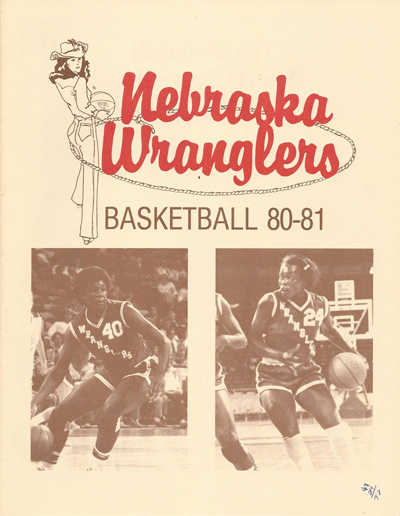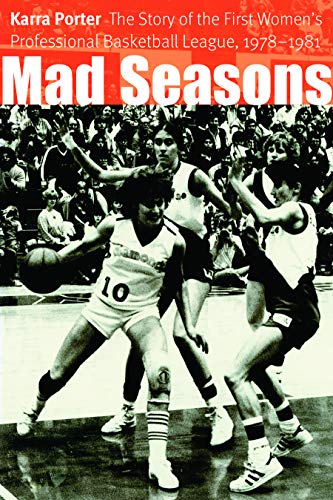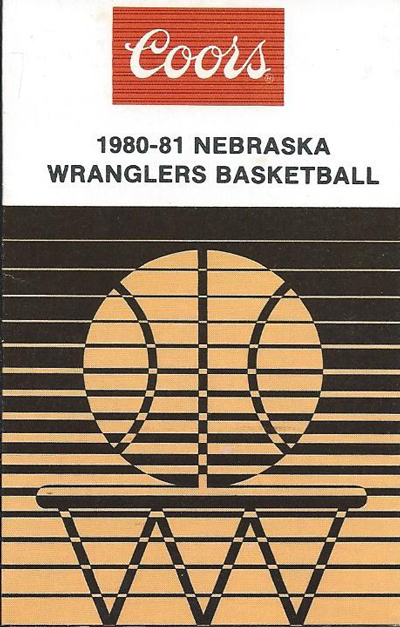Women’s Professional Basketball League (1980-1981)
Tombstone
Born: Summer 1980 – WPBL expansion franchise
Folded: Postseason 1981
First Game: November 30, 1980 (W 74-60 @ Minnesota Fillies)
Last Game: April 20, 1981 (W 99-90 vs. Dallas Diamonds)
WPBL Champions: 1981
Arena
Omaha Civic Auditorium
Opened: 1954
Demolished: 2016
Marketing
Team Colors:
Ownership
Owner: Larry Kozlicki
Trophy Case
Women’s Basketball League Most Valuable Player
- 1980-81: Rosie Walker
Editor's Pick
mad seasons
The Story of the First Women’s Professional Basketball League, 1978-1981
by Karra Porter
When you make a purchase through an affiliate link like this one, Fun While It Lasted earns a commission at no additional cost to you. Thanks for your support!
Background
The Nebraska Wranglers were a one-year wonder in the Women’s Professional Basketball League, the first effort to establish a nationwide women’s pro hoops league. The Wranglers joined the WPBL just in time to participate in its third and final season in the winter of 1980-81. The expansion club would go on to win the league championship in April 1981. But an off-the-court tragedy overshadowed the team’s triumph.
Originally awarded as the Colorado Wranglers expansion franchise in the summer of 1980, the club quickly shifted operations to Omaha where the Civic Auditorium offered available dates. The Wranglers joined a deeply troubled league. Of the fourteen WPBL clubs that began the 1979-80 season, three folded in midseason. Four more teams dropped out in the summer of 1980. The casualties included both teams that played in the 1980 championship series, the New York Stars and the Iowa Cornets.
Wranglers owner Larry Kozlicki, a Chicago-area tax attorney, was inexplicably granted a second chance in the owner’s box. Kozlicki owned the Long Beach-based California Dreams during the 1979-80 season. The Dreams were one of the three WPBL clubs that failed to finish out the season. The WPBL revoked his franchise in March 1980 after Dreams players walked out over months of unpaid salaries. But the league allowed Kozlicki to buy back in a few months later and the Wranglers were born.
Rosie Walker & the Season of the Rookie
The big news in the WPBL at the dawn of Year Three in late 1980 was the arrival of the top collegiate stars Nancy Lieberman (Dallas Diamonds), 6′ 5″ center Inge Nissen (Chicago Hustle), and Carol Blazejowski (New Jersey Gems). Lieberman and Nissen were the teammates at college powerhouse Old Dominion and went #1 and #2 overall in the 1980 WPBL draft. Blazejowski won the Wade Trophy as the top female collegian in 1978, but sat out the first two seasons of the WPBL to preserve her amateur eligibility for the 1980 Moscow Olympics. The trio of rookies entered the cash-strapped league with record contracts ranging from $40,000 (Nissen) to a reported $100,000 annually (Lieberman). The rookie paydays sparked some resentment among veteran stars exhausted from two seasons of folding teams and bouncing paychecks.
The Wranglers, meanwhile, quietly signed the #3 overall pick in the 1980 draft, former Stephen F. Austin center Rosie Walker. She would have the best year of the bunch, establishing herself as the league’s dominant post player.
With Walker among the league’s leading scorers and rebounders, the Wranglers raced to the top of the standings, despite the typical financial instability. Paychecks became sporadic after January 1981. Years later, former Wranglers players would tell WPBL historian and author Karra Porter for her 2006 book Mad Seasons that the club made due without an athletic trainer and occasionally resorted to hitchhiking on road trips to get from team hotels to the coliseums.
Murder of Connie Kunzmann
In early February 1981, the Wranglers travelled to Dallas for the final game before the WPBL All-Star break. Wranglers player Connie Kunzmann had her best game of the year, scoring 19 points and grabbing 10 boards in a losing effort. Kunzmann played the first two seasons of the league for the Cornets in her home state of Iowa. Former Cornets coach Steve Kirk took the Wranglers job and brought Kunzmann to Omaha after the Iowa club folded in September 1980. After the game, Kirk flew to Albuquerque to coach the All-Star game, along with All-Star selections Rosie Walker and Holly Warlick. The rest of the Wranglers travelled back to Nebraska.
In Omaha, the team had a regular nightspot at Tiger Tom’s bar. Kunzmann went drinking there with teammates on the night of Friday, February 6th, 1981. She met up with Lance Tibke, a man she and her teammates had met at a promotional event at the bar several weeks earlier. Kunzmann never showed up for practice the next day, alarming her teammates and Steve Kirk, still in New Mexico for the All-Star festivities. Kunzmann missed training again on February 8th and was officially reported missing.
On Tuesday, February 10th, Tibke, a 25-year old nuclear power plant security guard, confessed to killing Kunzmann during an argument. Tibke stated he had stabbed Kunzmann and beat her with a tire iron . He then disposed of her body in the half-frozen Missouri River. Winter storms and frozen ice hampered the recovery effort. Kunzmann remained missing for six weeks. Two local teenagers finally discovered her body on a river bank on March 28th, 1981. Tibke was sentenced to 40 years in prison for 2nd degree murder.
1981 Championship Run
The Wranglers played out the remaining two months of the WPBL regular season under the shadow of Kunzmann’s murder and the unresolved search for her body. The team finished the regular season a 27-9 record, tied for best in the league with the Dallas Diamonds. The Wranglers swept the Chicago Hustle in the WPBL semi-finals to earn a best-of-five championship series match-up with Dallas.
As they had all season, Walker and Lieberman dominated the 1981 WPBL championship series. Both players averaged over 30 points as the series went the distance. The contests at Dallas’ Moody Coliseum drew crowds of approximately 7,000. They were terrific numbers in a league where the average crowd was fewer than 2,000 fans.
The fifth and deciding game took place at Omaha Civic Auditorium on April 20th, 1981. Former Wranglers interviewed years later for Karra Porter’s Mad Seasons revealed that the team met prior to the game and considered refusing to play over still-unpaid salaries. But the Wranglers took the court and defeated the Diamonds 99-90. Rosie Walker turned in a command performance. The big center shot 12 of 16 from the field and converted 15 of 17 free throws for 39 points. The Wranglers held Lieberman to just 12 points. 3,500 Nebraskans turned out to watch the Wranglers win the 1981 WPBL championship. It turned out to be the final game in league history.
Closure & Aftermath
The WPBL never formally announced its dissolution. It just gradually dimmed to a flicker and went out. The college draft, typically conducted in June, never occurred. Clubs skipped meetings and missed conference calls. Kozlicki’s Wranglers and the Chicago Hustle expressed the most interest in continuing and sent out a survey to their fellow owners attempting to determine the state of the league. By December 1981, it was clear that there was no will to continue.
“We’re a team without a league,” Kozlicki announced in a brief statement to the press in mid-January 1982. The Wranglers were never heard from again.
Lance Tibke was paroled from prison on June 25th, 1990. He served only nine years of his forty-year sentence for the murder of Connie Kunzmann.
At least some Wranglers players never received the balance of payments owed them for their lone season in Omaha. All-Star Holly Warlick told The Pittsburgh Post-Gazette in 1987 that she had been the second highest paid player on the team, with an annual base and bonuses of $26,000, but that she had only collected about half that amount.
Voices
“The third season Rosie Walker was a dominating force in the league, but is not remembered as much as Nancy <Lieberman>, Carol <Blazejowski> and Annie <Meyers>, who had more high profile careers.T here are many other players who would have emerged as stars had they been given a little more time in their WBL careers.”
-Molly Bolin Iowa Cornets/San Francisco Pioneers Guard 1978-1981 (Interviewed 2011)
Links
###




One Response
According to http://dcs-inmatesearch.ne.gov/Corrections/InmateDisplayServlet?DcsId=33675, Tibke was paroled in 1990, after serving less than nine years for the murder of Connie Kunzman.